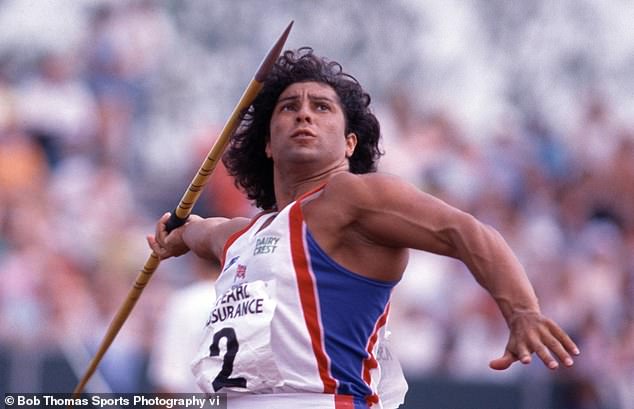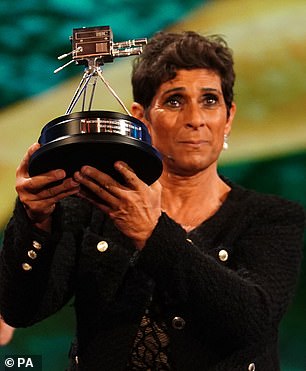Fatima Whitbread MBE, 62, has won Olympic silver and bronze in javelin. She was also the first British athlete to set a world record in a throwing event, at the 1986 European Championships, writes Dan Moore.
Abandoned as a baby by her Turkish Cypriot mother and left to die in a flat in Stoke Newington, North London, she was rescued by a neighbour and spent 14 years in children’s homes.
She was introduced to her mother at the age of five with whom she had occasional stays and during one she was raped by her mother’s friend.
Excelling at sport, her javelin coach, Margaret Whitbread, adopted Fatima at the age of 16 and brought her up with her own family in Essex. These childhood experiences led to her founding Fatima’s UK Campaign, which raises funds to protect and support vulnerable children and adults.
She won the 2023 BBC Sports Personality Of The Year Helen Rollason Award for outstanding achievement in the face of adversity. Fatima has one son, Ryan, 25, with her husband who died aged 64 in 2007, and they live in Ingatestone, Essex, with a Jack Russell terrier. Ryan has said of his mother: ‘Her will to succeed is born from her will to survive’.

Goal: Fatima, pictured competing in 1988, raises money for vulnerable children
What was the first money advice you were given?
I didn’t get advice because no one gave us any in the children’s home. Instead, I learned to be entrepreneurial to get ahead. I’d often find myself outside the headmaster’s office for one thing or another and he’d send me to the corner shop to buy him a pack of Embassy Number 9 cigarettes.
As there was always a penny left over, I’d play penny-up-the-wall round the back of the bike shed to earn enough to cover dinner for me and another girl at the home. I didn’t like standing in the free school dinner line because we had the mickey taken out of us mercilessly by other children.
If I didn’t have enough money, I’d go to the local chippy and bargain to see what I could get, and I’d be given some old scraps, a few chips. But I’d always cheekily ask for – and get – a pickled onion.
I’d also join in with bob-a-job week to carry out household chores to earn a shilling. I’d continue after the week was up, going back to the same houses and offering to clean their path. That’s how I learned the importance of being skilful with money, making the most of any opportunity.
How did you settle on a career in athletics?
Sport was my saviour at school. I liked the discipline, the routine and I was good at it. I became team captain at all the sports, organised the practices, motivated them. One team reached the league cup netball final and I was motivating them a little too loudly for the umpire, who threatened to send me off. This went on and I was threatened again. Anyway, we won.
Soon after that, the athletics season started and we went off to trials. I saw this tall blond guy with what seemed to be a spear, and I thought he looks interesting and so does his spear. But I wasn’t allowed to throw it until the javelin coach arrived. She turned out to be the threatening netball umpire, so I thought she’d never let me have a go.
Well, she did. Her name was Mrs Whitbread, who became my coach, then my mum, and the reason I became an athlete. My mum was a PE teacher, when she wasn’t coaching me, while my dad, John, was a docker. I also have two younger brothers, Greg and Kirk, who were four and two when I was adopted, and are now in their 50s. We lived a comfortable life in a council house that had belonged to Mum’s parents. She bought it in the 1980s.
When did you feel you’d made it?
When I was 18, I won the European Junior Championships 1979. It proved Mum and I were right about my career.
I never looked back. I was winning enough events, and getting the financial rewards that come with victories, to support myself.
It could have been different though, as I was offered a Wightman Cup place when I was 16, and this would have paid me £60,000 a year to play golf! I didn’t take it because I’d only just been adopted and didn’t want to be taken away from my family to play golf all over the world.

Honour: Fatima receives the coveted Helen Rollason award last month and, right,
What was the best year of your financial life?
I was paid around £250,000 in 1986, when I won the European Championships. This made me one of the highest paid athletes in the world at the time, but it didn’t compare to what they earn now.
What would you have done for a living if athletics hadn’t worked out?
In the early days I worked for the council, running fitness classes twice a week for £19 a go, before tax. I think I’d have turned that into a career, even though I knew in my heart that I’d be an athlete.
Do you own any property?
I bought my mum a house, and then one for Dad after they split, and I’ve always owned my own homes. I now have a two-bedroom bungalow, which I bought after my husband died more than 16 years ago. I downsized from a big old five-bedroom house on the same road as footballers Trevor Brooking and Clive Allen in Shenfield, Essex. I bought it for £300,000, and sold it during the financial crisis, which meant I had to drop the price by £250,000 to sell it for £1.75 million.
Are you a spender or a saver?
I’m not afraid to spend to help others, and I’ll save if there’s something I want to do. I’ve signed up to climb Mount Everest next May, because it’s a platform to raise money for kids in the care system through my campaign. Also, I love a challenge, and want to tick it off my bucket list.
Do you have a pension?
I’ve always paid into a pension. I had a very good accountant who told me that you have to look after your future.
What was your best money decision?
Buying my homes. I’ve owned all the properties I’ve lived in since I was earning, and never regretted it.
What is your top financial priority?
I’m not a materialistic person. Because of the way I was brought up, I just need enough money to pay my bills and live reasonably comfortably. Isn’t that what everyone wants?
- To donate to Fatima’s UK Campaign, which helps vulnerable young people, visit fatimascampaign.com.
Some links in this article may be affiliate links. If you click on them we may earn a small commission. That helps us fund This Is Money, and keep it free to use. We do not write articles to promote products. We do not allow any commercial relationship to affect our editorial independence.



